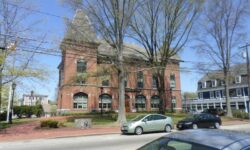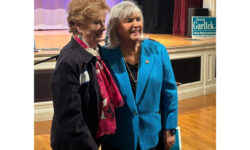[ccfic caption-text format="plaintext"]
By Amelia Tarallo
Hometown Weekly Correspondent
The concrete floor and walls of the room are bare. The only sources of light are a few newly-installed windows. Visitors standing in the right spot can look up and see a hole where a staircase used to zip up to the first floor. Trying to imagine musical protégés studying sheet music in practice rooms or recording pieces for auditions and college applications seems almost impossible.
However, on Wednesday, June 29, 47 high school musicians did just that. Hours before taking their places on stage, members of the John Philip Sousa Lowell Mason Heritage Band were given the chance to explore their namesake’s childhood home. The opportunity also allowed these students to preview plans to transform the house into a musical hub, honoring Mason’s legacy as a music educator.
Today, Lowell Mason is known as the father of music education. During his life, he taught in Boston public schools and was one of the co-founders of the Boston Academy of Music. Because of Mason’s efforts, music has become a crucial part of public school education, especially in Medfield.
While walking through the first floor of the house, Thomas Scotti, who also serves as Treasurer of the Lowell Mason House Foundation, explained how this floor will probably be used as a museum, housing artifacts such as hand-written music, a passport, portraits, and a personal bible. This level of the house will hopefully be restored to resemble how it appeared during Mason’s lifetime and serve as a reminder of the great musician’s beginnings in Medfield.
Efforts to save and restore the birthplace of Lowell Mason started when the house narrowly escaped demolition in 2010. Thanks to a group of dedicated Medfieldians, including Thomas and Karen Scotti, who hosted last Wednesday’s tour, the house was moved to Green Street, where it began a long road of renovations to turn the house into a place of education and musical prosperity.
Climbing a surviving staircase, the visiting band members followed Thomas Scotti to the second floor of the house. Refurbishment recently revealed the treasure trove of colonial architecture qualities hidden in the house. The removal of paneling in one room led to the discovery of gunstock posts, support beams shaped like muskets. Qualities such as these are sure to be uncovered as the quest to restore the house continues. Each one will not only help visitors visualize what the house looked like back in the 1700s, but also give a clearer imagine of how Lowell Mason lived his life.
Though the renovations on the house are far from being finished, the tour served as an inspiration for the young visitors. “We think the kids got a real sense of history of how someone like Lowell Mason worked very hard to make music part of the school curriculum. By being in and seeing his birthplace, they can make a better connection to their own experience with music almost 180 years later,” said Thomas Scotti when asked why it was important for music students to visit the house, “Without Lowell Mason (and many others) we would not have music in our schools as we have it today. Real people made that happen.”









